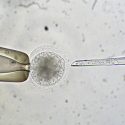Monsanto supports UW plant breeding with $1 million fellowship gift
Monsanto Co. has made a $1 million gift to support plant breeding and genetics in the College of Agricultural and Life Sciences (CALS) at the University of Wisconsin–Madison.
The Monsanto Graduate Fellowship in Plant Breeding will help fund Ph.D.-level graduate students in the plant breeding and plant genetics program, a UW System Center of Excellence, in CALS.
“Plant breeding defines an activity that will be an essential component of our planetary stewardship as we feed our growing population through the coming century,” says CALS Dean Molly Jahn. “This gift from Monsanto will allow us to explore revolutionary approaches toward improved agricultural productivity and environmental stewardship while we train the next generation of plant breeders.
“Our partnerships with the private sector are principled relationships designed to protect our public sector missions while we train the next generation of agricultural scientists,” she says.
Monsanto sees the UW–Madison program as a strong partner. “The University of Wisconsin–Madison has a long history of training outstanding plant breeders through its interdisciplinary graduate training program,” says Bob Reiter, vice president of Breeding Technology for Monsanto.
“This record of achievement combined with the diversity of research opportunities for students in row and vegetable crops makes the university an attractive partner in Monsanto’s efforts to support the training of the next generation plant breeders and biometricians,” Reiter says.
The UW–Madison Plant Breeding and Plant Genetics graduate training program is one of the leading such ventures in the world. At UW–Madison, graduate training is research based and emphasizes critical thinking and analytical skills. Students in the program generally take courses in quantitative genetics, statistics, experimental design and molecular genetics.
“Over the past 20 years, no program in the country has trained more plant breeding and plant genetics PhD students than ours,” Jahn says. “We have an outstanding faculty who are respected not only for their top-flight research but for their ability to prepare students to excel in both academic and industry settings all around the world. One of the real strengths of our program is its interdisciplinary nature. Our students are part of a very active community that welcomes global scientific leaders to campus, and they get broad exposure to the most important issues in the field.”
Professor Irwin Goldman is a vice dean in CALS, and he has a long history with the plant breeding and plant genetics program. “This support from Monsanto demonstrates a real partnership with an incredibly successful private sector company that depends on the kind of top-quality graduates that Wisconsin can produce,” he says.
“We can make use of the outstanding faculty and staff at UW–Madison, along with our research infrastructure, our colleagues in supporting disciplines and the premier atmosphere for graduate training on our campus while helping to educate students who will be the workforce that Monsanto and others will want to hire in the future,” Goldman says. “In a sense, both parties are bringing key resources and expertise to the table, and in the end we will both benefit from this partnership.”
Gifts such as Monsanto’s not only help the graduate students and the University’s programs. They boost the people and economy of Wisconsin, he says.
“These top-flight graduate students help bring the excellence to our research programs,” he says. “They are the ones who do the work that allows us to apply for competitive funding and produce high-impact publications. They help leverage funding for research from a variety of sources, due to the high quality of their work and the determination and dedication that is a hallmark of graduate students at the University. The impact of their work is magnified by the systems and channels established by our college, state and UW System.”
Monsanto is a leading global provider of technology-based solutions and agricultural products that improve farm productivity and food quality. Monsanto remains focused on enabling both small-holder and large-scale farmers to produce more from their land while conserving more of our world’s natural resources such as water and energy.

